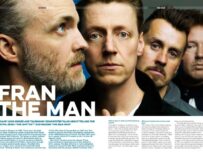
Isaac Hanson [centre]: “You cannot underestimate the significance of stubbornness.”
With over two decades in the bag as part of the sibling pop trio, we chat with their eldest member
It’s safe to say that Hanson have had a pretty incredible 2017. Not only is it Isaac, Taylor and Zac’s 25th anniversary as an official group but it is also 20 years since they stormed the charts with their worldwide, career-changing hit MMMBop and its 10 million-selling parent album, Middle Of Nowhere. What better way to round off this year of celebration than with a new festive album and a tour, which hit Manchester on 10 December.
We were lucky enough to chat to guitarist, singer and eldest Hanson brother Issac about what this year has meant to them as a band and how they are celebrating now that Finally It’s Christmas.
Discover how MMMBop was written
Are you excited about this special Christmas tour?
“Yeah, we are really excited. Right now we are in the throes of preparation and I think everyone is feeling the inevitable pressure of the last days of rehearsals. It’s one thing to be doing a tour, it’s another to be doing a set of shows that are literally filled with songs, in almost all cases, that we have never actually performed live before. It’s kind of an interesting shift in the dynamic of the show. It’s one of those things, especially when you have been doing this for as long as we have, you’ve got a list of go-to songs that you know you can always pull out. It’s an extra layer of pressure, but it’s good and challenging all at the same time.”
It’s such an incredible year for you: your 25th as a band and 20 years since Middle Of Nowhere. How does that make you feel?
“We are very proud of what we’ve been able to do. There are obviously plenty of challenges that go along with being a band, whether it be just getting records out and being successful with them, or the band/brother dynamics, but I think we’ve managed to get through most of that with most of our arms and legs intact! There is something very liberating about having done something for as long as we’ve now done it. I think that there’s a certain degree, when you kinda hit a milestone like this, where you just feel: ‘Well okay, there are no rules.’”
Why do you think you have managed to stay together for so long?
“You cannot underestimate the significance of stubbornness. The Oklahoma state motto, which we only discovered in the last couple of years and made me laugh really hard, is ‘Labor Conquers All’ – just keep working hard. When things get hard you have to dig in and work harder and that’s how we’ve approached a lot of things. It’s not always been the most glamorous. I think the thing that has been our defining characteristic as a band is that we have never been afraid to be outside of the norm, outside of being popular or not. We like making the music that we make and, as long as we are happy with the music that we are making, then we are happy.”

Isaac Hanson: “The songwriting has always been something that we cared deeply about and worked very hard on.”
When listening to your albums, even though there are differences in your sound each time, they’ve always felt so Hanson. Why do you think that is?
“Despite the fact that we have had extraordinary levels of pop success in our career, I think it’s pretty clear to us and to others that Hanson has never been worried about following trends. Even going back to our most – shall we say – ‘trendy’ period, I still think it would be debatable whether Hanson were trendy. We had always been outside the world of what was surrounding us, when we were first starting we were kids from Oklahoma and we weren’t doing grunge music. We weren’t a track act, we weren’t a vocal group, we were a band and we were songwriters first – that has always been who we were.
“We’ve always cared very deeply about the music that we’ve made, we are always intimately involved in it. I think the thing that has really kept us together, despite all the ups and downs, is the fact that the music and the songs we’ve been making have come directly from us in a personal and real way. I think it’s unique to some degree with bands, especially to people who started out as young as we did; being the songwriters first, more than just about anything. The singing we were naturally born with; the songwriting has always been something that we cared deeply about and worked very hard on.”
What is your earliest memory of music?
“My earliest vivid memory was listening to my dad’s Walkman, probably in 1989, and I was listening to a 1958 compilation cassette tape that my parents had bought us before we went down to South America. I remember clearly listening to those early songs: it started with Chuck Berry’s Johnny B. Goode and went into Summer Time Blues. It was all these great iconic, ageless rock and roll songs, and I ended up memorising all that music. It lit a fire in me and then I ended up asking my mum how to play piano. She taught me how to play C, F and G and I wrote a whole little song. It wasn’t fantastic, by any stretch of the imagination, but it was a song that gave me the confidence.”
Can you remember when the three of you became a band?
“Our very first gig was an a cappella gig. We did a half-hour show that was mostly covers and then a couple of years later we ended up getting a drum kit and an electric guitar. We started playing shows as a band in the summer of 1994. Over time it became very clear: in order to be a rock and roll band we would have to diversify and go beyond just being singers and piano players – we wanted to do more than that.”
Do you tend to write together as a band or do you write on your own? Or is it dependent on the song?
“There are a variety of ways that songs come together. We will call this ‘version A’ – there’s an idea that one of us has, sometimes it’s very well-formed and sometimes it’s purely a lyrical hook and some melodic structure. You play it for somebody and then it comes together in some form or another.
“Or you have the version where you are rehearsing together, you’re writing a song and some other tangent or inspiration shows up and you chase the muse. We have gotten particularly good at chasing the inspiration in the last 10 years because we put that into a high pressure situation on purpose.

Isaac Hanson: “Sometimes creativity expands and contracts based on how much time you give it.”
“We started with some songwriting events that we started hosting. We would get friends together and we would spend a week and all write songs every day. We would write these songs and record them in the same day and it became this very intense, inspirational experience. We started transforming our fan club EPs through channeling that energy. Each year we put out an EP of five songs that we would write and record in a very condensed period of time. We would just literally say, ‘We’re going to start recording on this date and we’re going to do this as quickly as possible.’ Not because we want to rush the process, but it has a lot to do with the fact that sometimes creativity expands and contracts based on how much time you give it. The really nice thing about putting yourself in that pressure situation is that you don’t over-analyse certain details of the song.”
Is there a particular setting that you like writing in, a location or time of day?
“I would tend to say my most significant periods of inspiration have more consistently been at night. It tends to be extremes, late at night or right at the beginning of your day. It’s rare when right in the middle of everything else that’s going on in your life there’s, ‘Wait, creative moment!’”
Do you ever get writer’s block?
“Absolutely.”
How do you get through that?
“There’s two ways: the first way is that you really try to push through and listen to lots of other music as a coping mechanism of sorts and you force the process. But the thing that is more effective is going and doing things that are completely different to writing songs. ‘Oh I can’t write a song.’ Well, then go for a run or go hang out with your friends, go do something that is not going to require the same level of psychological or emotional energy, something that is going to fill you with ideas and inspiration. Don’t keep labouring over something. That’s also the challenge; writing songs is as much about pushing through the hard part as it is getting inspiration. I find that the hardest part is completing the song, coming up with the complete picture. The hardest thing to write is the second verse.”
You are very much a family band. Was it a natural progression to have your children start appearing in your videos and doing backing vocals on the new album?
“I wouldn’t expect that to be the case consistently but there were a couple of things that lined up. The song I Was Born has a certain unabashed optimism, a youthful energy about it – it’s not jaded. It talks about the fact that it is hard to chase your dreams, that it’s hard to do what you were born to do, so go out there and chase it. It’s easy to be cynical – and trust me I am a cynic – but when you have an idea and a song like that, it makes a lot more sense to see a young person singing it. It allows people to see a point in their own lives when they were that young optimistic person. The point is: don’t waste the moment, don’t waste your life saying, ‘Woulda, coulda, shoulda.’ Spend your life embracing the opportunities you have in front of you and chasing the valuable things.”
Interview: Fern Dunn


































Related Articles